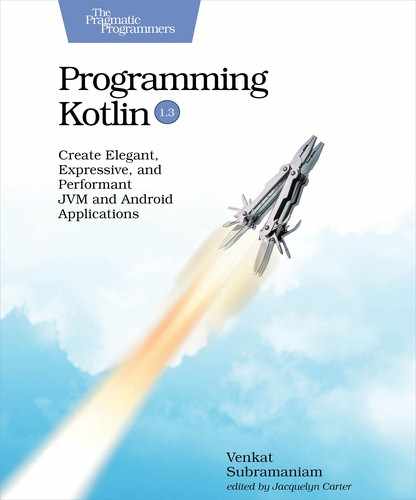Improved Equality Check
Just like Java, Kotlin also has two types of equality checks:
-
equals() method in Java, or == operator in Kotlin, is a comparison of values, called structural equality.
-
== operator in Java, or === in Kotlin, is a comparison of references, called referential equality. Referential equality compares references and returns true if the two references are identical—that is, they refer to the same exact instance. The operator === in Kotlin is a direct equivalent of the == operator in Java.
But the structural equality operator == in Kotlin is more than the equals() method in Java. If you perform str1.equals(str2); in Java, you may run into a NullPointerException if the reference str1 is null. Not so when you use == in Kotlin.
Kotlin’s structural equality operator safely handles null references. Let’s examine that with an example:
| | println("hi" == "hi") |
| | println("hi" == "Hi") |
| | println(null == "hi") |
| | println("hi" == null) |
| | println(null == null) |
If these comparisons were done with equals() in Java, the net result would have been a runtime NullPointerException, but Kotlin handles the nulls safely. If the values held in the two references are equal then the result is true, and false otherwise. If one or the other reference is null, but not both, then the result is false. If both the references are null, then the result of the comparison is true. We can see this in the output, but you’ll also see an added bonus in there:
| | true |
| | false |
| | false |
| | false |
| | true |
| | equality.kts:3:9: warning: condition 'null == "hi"' is always 'false' |
| | println(null == "hi") |
| | ^ |
| | equality.kts:4:9: warning: condition '"hi" == null' is always 'false' |
| | println("hi" == null) |
| | ^ |
| | equality.kts:5:9: warning: condition 'null == null' is always 'true' |
| | println(null == null) |
| | ^ |
The output confirms the behavior of == operator like mentioned. The output also shows yet another example of Kotlin’s sensible warnings—if the result of comparison will always be an expected value, it prompts a warning suggesting we fix the code to remove the redundant conditional check.
When == is used in Kotlin, it performs the null checks and then calls equals() method on the object.
You’ve learned the difference between using equals() in Java and == in Kotlin. Next let’s look at the ease with which we can create strings with embedded expressions.
